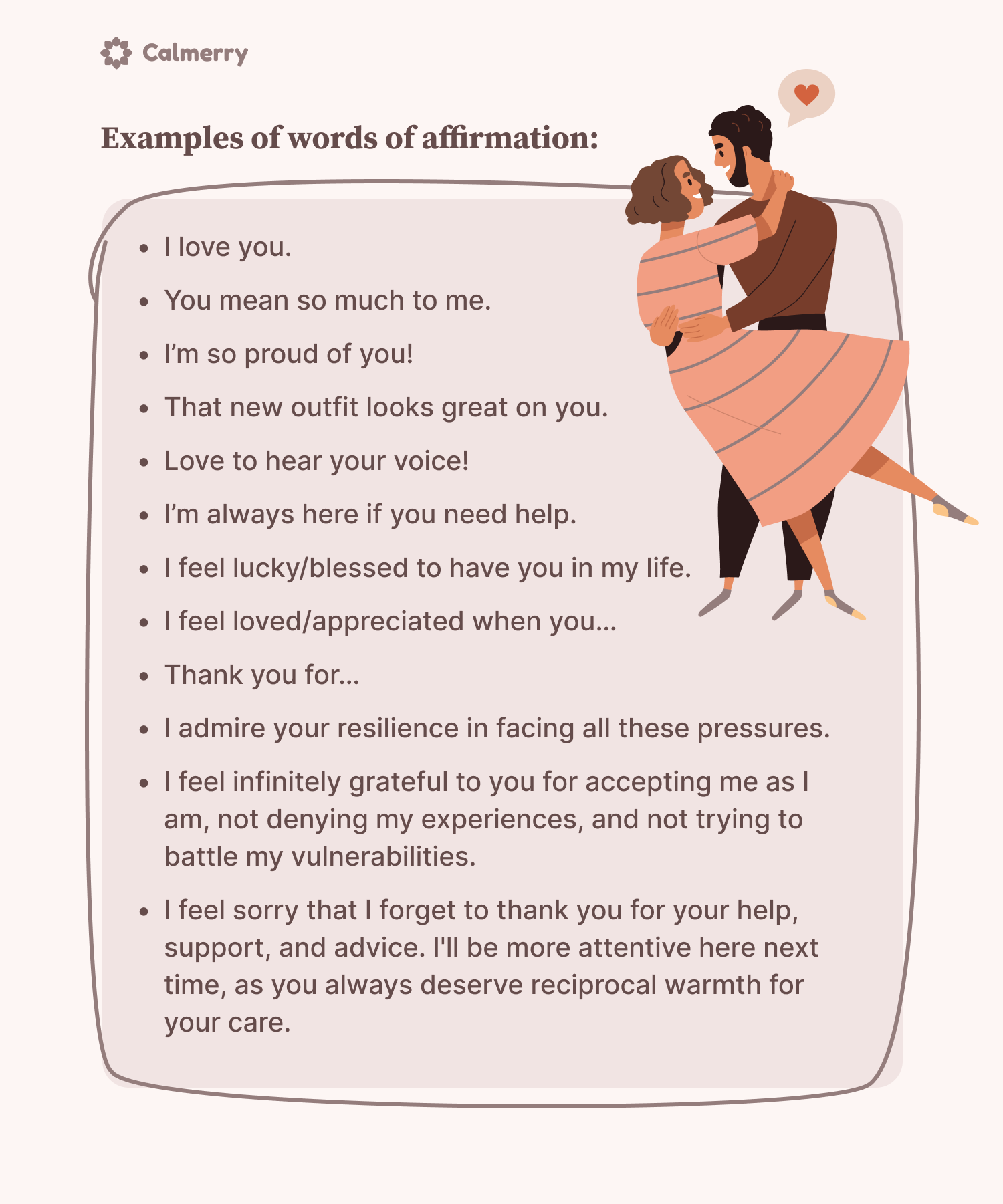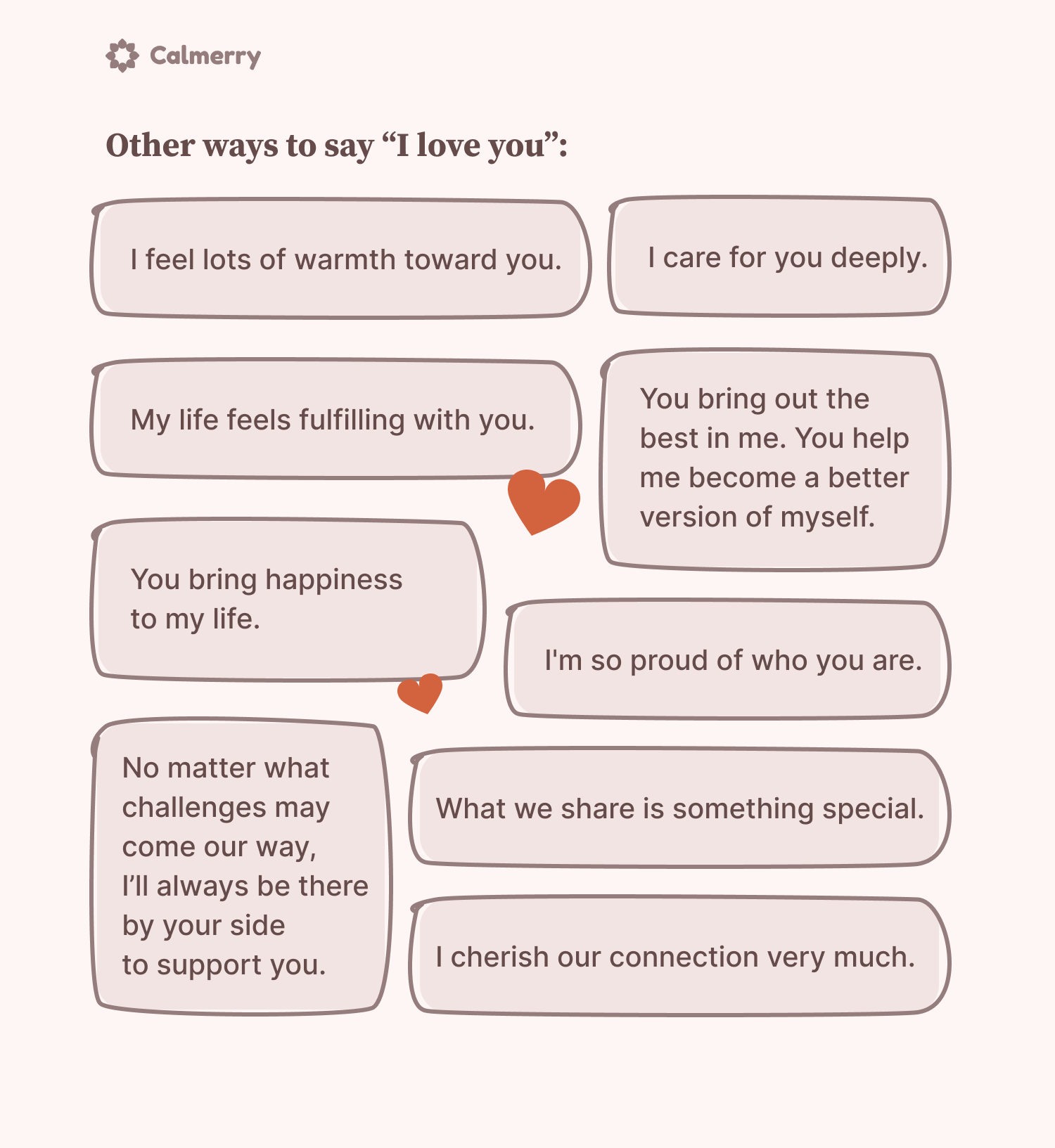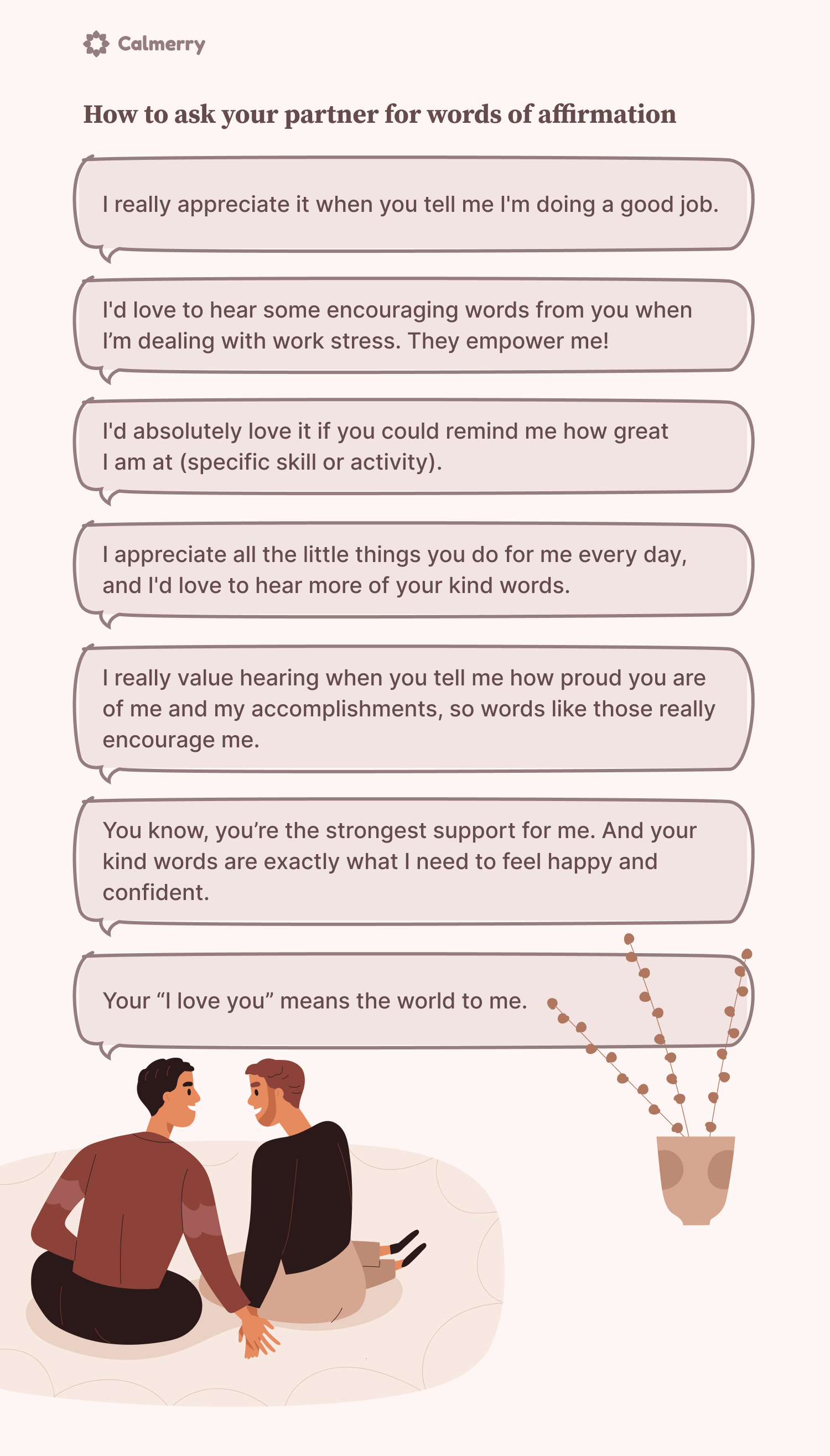Words of Affirmation: What Are They, and How to Use Them in Your Relationship?

In this article
At Calmerry, we understand that everyone has a different way of expressing and receiving love. While some equate this feeling with spending time together, others prefer physical touch or receiving gifts. Some people, meanwhile, like it when their partner offers help in any way they can or showers them with compliments or words of encouragement.
The concept described above is referred to as love language, developed by author and pastor Gary Chapman, Ph.D. According to him, there are 5 love languages that define the way we show and receive love from other people.
Although all of us can relate to most of these languages, it is likely that there’s one that will stand out or speak to us the most. These include:
- Words of affirmation – written or spoken compliments that show love, affection, and appreciation.
- Physical touch – non-verbal communication or the use of physical touch to show love.
- Quality time – spending focused and uninterrupted time together.
- Receiving gifts – being thoughtful or giving gifts, surprises, or tokens of love to their partner.
- Acts of service – providing help/support to ease stress or the burden of responsibilities.
Words of affirmation is one of the most common primary love languages. If this is your partner’s love language, it only means they get a thrill when you pay them compliments or say words of encouragement.
Telling your significant other “I love you” on a regular basis or congratulating them for a job well done is one example of using words of affirmation.

What are words of affirmation?
Words of affirmation focus on verbal expressions or expressing emotions through spoken or written words. [1] Stavraki, I. (2024, July 30). What is the words of affirmation love language? Simply Psychology. https://www.simplypsychology.org/words-of-affirmation.html As previously mentioned, those who have this as their love language feel the love and appreciation of their partner when they shower them with compliments, as well as acknowledge their work and effort.
Here are a few examples of words of affirmation:
- I love you.
- You mean so much to me.
- I’m so proud of you!
- That new outfit looks great on you.
- Love to hear your voice!
- I’m always here if you need help.
- I feel lucky/blessed to have you in my life.
- I feel loved/appreciated when you…
- Thank you for…
- I admire your resilience in facing all these pressures.
- I feel infinitely grateful to you for accepting me as I am, not denying my experiences, and not trying to battle my vulnerabilities.
- I feel sorry that I forget to thank you for your help, support, and advice. I’ll be more attentive here next time, as you always deserve reciprocal warmth for your care.
While words may not carry enough weight to some people, those who have this love language, find meaning and value in spoken and written words.
This is also the reason why negative comments, criticism, or gaslighting can hurt them a lot. For those who’re particularly drawn to words as a way of expressing and receiving love, words do carry emotional power. And even casual remarks can make them feel very vulnerable and shutter with self-doubt and worry.
How to use words of affirmation
If this is your partner’s love language, and you’re not so great with words, you can always practice. Choosing your words carefully and searching deep in your heart about why you love and care for your significant other can help.
Here are a few things to remember when using words of affirmation in your relationship.
Be genuine
Authenticity is the key when expressing your emotions. If your partner’s primary language is words of affirmation, know that they value the intentions and feelings behind your words.
It’s also likely that they’ll be able to tell if you’re faking it or just saying things to them. Back your words with genuine feelings and be specific when paying a compliment or expressing your love and affection.
Try to avoid shortcuts or rushed compliments. Saying, “You’re lovely, can we go now?” can come off as dishonest and insincere.
Say “I love you” often – and when you feel like it
Gesture matters, but for those who gravitate towards words of affirmation, saying “I love you” often is greatly appreciated and valued.
It reaffirms that you have a strong and positive relationship, and it makes your significant other feel unconditionally accepted. Letting someone know you love them can also nurture emotional intimacy and vulnerability between two people.
There are several ways to say “I love you” without actually uttering these three words. Consider these examples:
- I feel lots of warmth toward you.
- My life feels fulfilling with you.
- I care for you deeply.
- You bring happiness to my life.
- What we share is something special.
- I cherish our connection very much.
- I’m so proud of who you are.
- You bring out the best in me. You help me become a better version of myself.
- No matter what challenges may come our way, I’ll always be there by your side to support you.

Do take note that even simple phrases can also mean “I love you.” Saying “I’m sorry” could also indicate the same thing, as this means that you take responsibility for your actions and want to make things better.
The same can also be true for saying “have a great day” and “take care.”
Express it in writing
If you find it hard to say what you feel face-to-face, consider writing a highly personalized message.
Your partner will most likely appreciate it more if you craft your own words instead of quoting a movie or copying something online. They will find it more special, relevant, and romantic if the message comes from your heart.
Choose your words wisely
People with this love language value words a lot and can be overly sensitive to negative comments. This is why you need to be careful about your choice of words and the way you say them.
Think before you speak, and avoid being critical or condescending. If you feel the need to say something constructive (like healthy criticisms), try to squeeze in some sincere compliments to make your feedback less hurtful.
And, most importantly, appeal to your needs rather than making them think that there’s something wrong with them.
– Kate Skurat, Former Clinical Product Manager at Calmerry
Know the words that speak the most to your partner
Find the words or phrases that your significant other loves hearing the most. While some prefer compliments or words of encouragement on a daily basis, some love phrases that acknowledge their work and effort.
Just be sure to tailor your words or message, so they feel personal and well-thought-out. Being too generic or vague can come off as fake and insincere.
It can also be helpful to create a list, especially if you feel like you don’t have a way with words. Listen and search for affirming words and customize them to fit the situation or your partner.
This can help increase your vocabulary and allow you to come up with something new, fun, and creative when the situation demands it.
Be creative
Instead of just saying nice things plainly, think outside the box or find creative ways to communicate your love. You can try sending them an unexpected text saying you were thinking of them or leaving random love notes inside the house.
You can also write them a song or put together a customized playlist or give them a pep talk before a big presentation at work.
Show empathy
This is particularly helpful when your partner is feeling down. Recognize how they are feeling and try to picture yourself in their shoes to understand things from their perspective.
It’s also important to be empathetic while acknowledging and validating their emotions. Show care and concern when they tell you their problems and let them know you have their back whatever happens.
Notice the little things
Don’t just mention or compliment the obvious things. Recognize and acknowledge the little ones or those that are usually taken for granted.
Take note that people who have words of affirmation as their primary love language also tend to notice and remember tiny details in other people’s lives. Doing the same for them can make them feel important and loved.
How to ask your partner for words of affirmation

Asking your partner for words of affirmation can feel intimidating. Making the request to almost literally speak your language may make you feel vulnerable or that you’re putting too much pressure on your partner to “reassure” you. [2] MasterClass. (n.d.). Words of Affirmation Love Language: How to Affirm Your Partner – 2025 – MasterClass. https://www.masterclass.com/articles/words-of-affirmation-love-language
If you’re concerned about how they will respond, it’s best to approach the conversation with an open mind and a judgment-free and pressure-free attitude. Try to communicate your emotional needs using the “I-statements” and aligning your intention with empathy and compassion.
For example, you can start with these phrases:
- I really appreciate it when you tell me I’m doing a good job.
- I’d love to hear some encouraging words from you when I’m dealing with work stress. They empower me!
- I’d absolutely love it if you could remind me how great I am at (specific skill or activity).
- I appreciate all the little things you do for me every day, and I’d love to hear more of your kind words.
- I really value hearing when you tell me how proud you are of me and my accomplishments, so words like those really encourage me.
- You know, you’re the strongest support for me. And your kind words are exactly what I need to feel happy and confident.
- Your “I love you” means the world to me.
Additionally, express your appreciation for any positive responses your partner gives. Doing this helps create a safe space within the relationship where both partners feel comfortable communicating openly with one another.
Finally, prioritize giving words of affirmation back to your partner as well. Acknowledging the effort they put into something can go a long way toward building mutual respect and trust.
Ultimately, being generous with positive reinforcement and kind words can create a positive cycle in the relationship where both partners know that it’s safe to share encouraging words with one another. And where both feel appreciated and supported.
What to avoid if your partner’s love language is words of affirmation
Since words mean so much to people who have this as their primary love language, be sure to avoid harsh or highly sensitive and negative comments.
Here are a few other things to avoid if your significant other’s love language is words of affirmation:
- Don’t give fake affirmations. They can do more harm than good.
- Don’t just copy-paste words or phrases. Try to make them personal or adapt them to the situation or your partner’s preferences.
- Don’t make compliments for the sake of saying or making them. Follow your heart and be sincere.
- Don’t disregard your tone or mindlessly say things. Say words like you mean and really feel them.
- Don’t just assume they know that you love and appreciate them. Tell them through spoken or written words. This can mean the world to them!
How counseling or online therapy can help
If you’re having a hard time expressing your feelings or understanding your partner’s love language, help is always available. Consider online relationship therapy.
Online therapy can be a great way to learn more about the words of affirmation love language and how to incorporate them into your relationship.
Through therapy, those who use this love language can become more aware of the ways in which this form of communication is beneficial for them and their relationship, and with the support of Calmerry, professional counseling can aid in learning different strategies to express affection through spoken words on a regular basis effectively.
Stavraki, I. (2024, July 30). What is the words of affirmation love language? Simply Psychology. https://www.simplypsychology.org/words-of-affirmation.html
MasterClass. (n.d.). Words of Affirmation Love Language: How to Affirm Your Partner – 2025 – MasterClass. https://www.masterclass.com/articles/words-of-affirmation-love-language
online therapy
live video session



